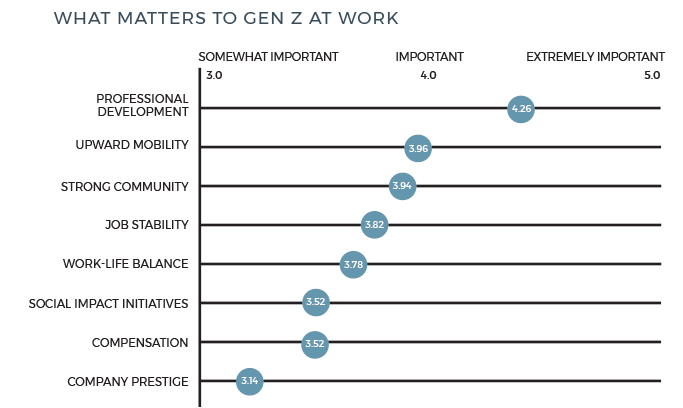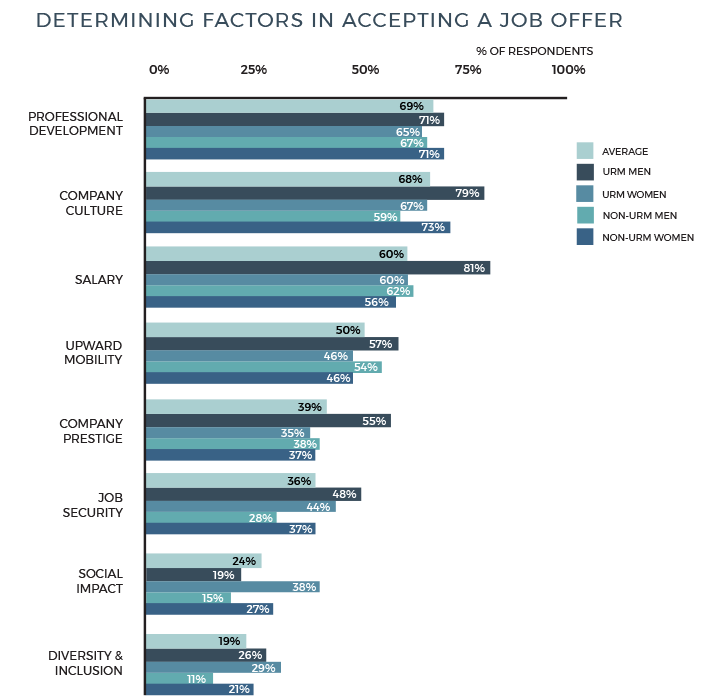Does Generation Z Care About Your Company’s Social Impact Initiatives?
Want a cheat sheet to Generation Z? Download our infographic on "5 Fast Facts Every Employer Should Know About Generation Z" here.
Generation Z is often cited as one of the most socially-conscious generations to date. Study after study has shown that this generation cares about social issues and, even more significantly, cares about companies that care about social responsibility.
A report from MNI Targeted Media found that 56 percent of Gen Zers consider themselves to be socially conscious, and more than 50 percent cited a brand’s social consciousness as something that influenced their purchasing decisions. Another Gen Z survey by Trendera found that nearly 70 percent of Gen Z holds progressive viewpoints, and a survey by DoSomething Strategic found that 76 percent of Gen Z said they have purchased or would consider purchasing from a brand to show support for the issues that the company supported. A whopping 94 percent of Gen Z respondents to a Cone Communications survey said they believe companies should help address critical social issues.
It’s clear Gen Z wants to put their money where their values are. But what about where they get that money from? In other words – will your company’s social impact initiatives attract Gen Z talent?
RippleMatch’s candidate onboarding survey reveals what Gen Z candidates actually value in the workplace, including their attitude toward social impact initiatives. Upon signing up for RippleMatch, students are asked to rank the importance of workplace factors like professional development, social impact, community and work/life balance on a scale from 1-5, with 1 being “Not at all Important” in a job and 5 being “Extremely Important.”
Data collected from tens of thousands of entry-level candidates reveals that while employment at a socially conscious company would be nice to have, it’s far from the most important thing to Gen Z candidates when searching for a job. However, it still ranks as a somewhat important factor in the Gen Z job search, even more so than company prestige.

When looking at the results from our Gen Z respondents as a whole, a company’s social impact initiatives are more important than company prestige, and equally important to compensation. Professional development, upward mobility, and a strong sense of community hold more weight than social responsibility, but it’s significant that, as a whole, Gen Z considers a company’s social impact initiatives as important as their compensation packages and more important than company prestige.
The importance of a company’s social impact initiatives also vary depending on which Gen Z subgroup you’re looking at.
Taking a closer look at our data, we found that social impact initiatives are more important to women than to men, with women valuing a company’s social impact initiatives more than compensation while men care more about compensation than they do social impact.

Looking even closer, black women placed the most importance on social impact initiatives out of all subgroups. While men who identified as underrepresented minorities (URMs) cared more about social impact than non-URM men, it’s clear that the real divide emerges between genders.

The variance between men and women and different racial and ethnic groups isn’t shocking when you look at external data – a study produced by MTV and the Public Religion Research Institute found that Gen Z women tend to be more politically and civically active than Gen Z men, volunteering, posting on social media about causes, signing online petitions more often than men, and viewing protests more positively than young men do.
The importance of issues such as gender equality, climate change, race relations, LGBT rights, and income inequality also varied by race and ethnicity. Black and Hispanic young people cared the most about those specific issues, followed by white young people, who cared the least about the slate of issues presented.
Despite the variances, it’s clear that Gen Z views corporate social responsibility as a positive factor when searching for a job. But how much does it actually influence whether or not they accept a job?
Our report on Class of 2018 graduates takes a look at the challenges of the job search, as well as the determining factors that led to accepted job offers. The report is based off our survey of more than 700 class of 2018 graduates from universities across the country, who now work in industries such as finance, technology, healthcare, consulting, and more.
We asked respondents, “What were the most important factors that led you to accept your job?” and gave them the option to select all factors that applied to them. The results showed that only 24 percent of overall respondents selected a “Company’s Social Impact Initiatives” as a factor that led to their accepted offer.

Similar to the data collected through our candidate onboarding survey, when we examined the results of our survey by race and gender we found that some groups prioritize social impact more than others.
URM women cared the most about corporate social responsibility, with 38 percent citing social impact initiatives as influencing their decision. Only 15 percent of non-URM men responded saying that a company’s social impact initiatives was an important factor in accepting a job.

Unlike in our candidate onboarding survey, salary was much more important when it actually came down to accepting an offer. Gen Z women in our candidate onboarding survey placed a higher value on social impact initiatives than compensation, but in our Class of 2018 survey, compensation more heavily impacted their decision. Even company prestige emerged as a more important factor than social impact for all groups except URM women. Social impact initiatives can attract more Gen Z women to your company, but securing an accepted offer will likely come down to salary and company culture.

It’s clear that Gen Z is a group of socially-conscious consumers and employees. While a company’s social impact initiatives alone won’t capture Gen Z talent, a lack of corporate social responsibility initiatives will make it more difficult to engage with Generation Z and especially Gen Z women. Not only is it the right thing to do, investing in social impact initiatives can give you a competitive edge when recruiting your next generation of top employees.
Want more information on what company initiatives Generation Z cares about? Download our comprehensive report on 'What Gen Z Wants at Work' below.





